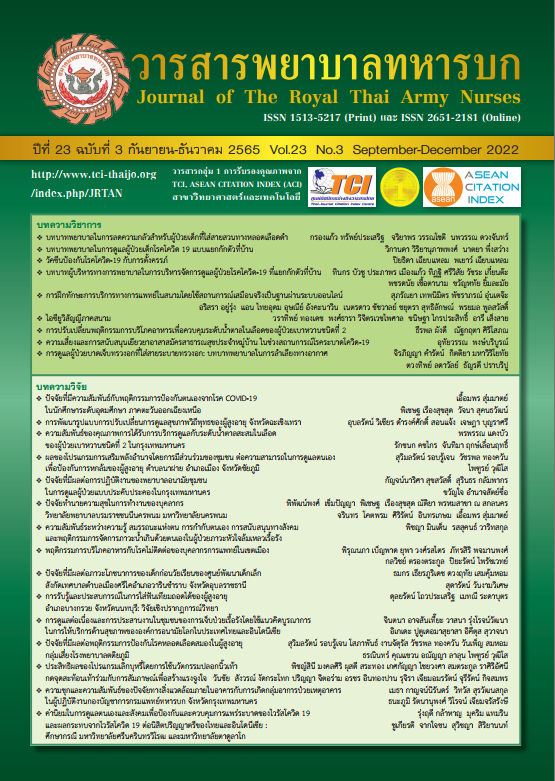Factors Associated with Self-Protective Behavior of COVID-19 in Undergraduate Students in the Northeastern Region
Keywords:
COVID-19, health literacy, knowledge, self-protective behaviorAbstract
This analytical cross-sectional study aimed to determine health literacy, knowledge, self-protective behavior and to determine factors associated self-protective behavior of COVID-19 among undergraduate students. This study was conducted using an online questionnaire survey among the undergraduate students from 6 universities in the northeastern region from 27 October to November 7 in 2021. The questionnaires collected socio-demographic characteristics, health literacy, knowledge and self-protective behavior of COVID-19. The content validity of the health literacy, knowledge and self-protective behavior were 0.93, 0.89 and 0.83. Likewise, the reliability was 0.89, 0.79 and 0.84 respectively. Data were analyzed using descriptive statistics and multivariable analysis was performed using multiple logistic regression to identify the factors associated with self-protective behavior of COVID-19. A total of 950 respondence were included in this study, and 57.9% were majoring in health care. Those groups also expressed vaccination intention (42.0%). The majority of participants (91.5%) had a high level of self-protective behavior of COVID-19 (95%CI: 88.9-92.4). Multivariable analyses shown that female respondence (OR = 3.68; 95%CI: 2.11-6.43; p<.001) and the high level of health literacy were likely to be more adopt self-protective behavior of COVID-19 (OR = 6.88; 95%CI: 3.82-12.39; p<0.001). Findings from this study highlight the necessity of education for improving the health literacy of undergraduate students to strengthen for their self-protective behavior of COVID-19 and protect themselves from other infectious diseases.
Downloads
References
Huang C, Wang Y, Li X, Ren L, Zhao J, Hu Y, et al. Clinical features of patients infected with 2019 novel coronavirus in Wuhan, China. Lancet Lond Engl. 2020;395(10223):497–506.
Felsenstein S, Herbert JA, Mc Namara PS, Hedrich CM COVID-19: Immunology and treatment options. Clin Immunol. 2020; 215:108448.
Shahnazi H, Ahmadi-Livani M, Pahlavanzadeh B, Rajabi A, Hamrah MS, Charkazi A. Assessing preventive health behaviors from COVID-19: a cross sectional study with Health belief model in Golestan Province, Northern of Iran. Infect Dis Poverty. 2020; 9(1): 1-9.
Lotfi M, Hamblin MR, Rezaei N. COVID-19: Transmission, prevention, and potential therapeutic opportunities. Clin Chim Acta Int J Clin Chem. 2020; 508:254–66.
Kregar Velikonja N, Dobrowolska B, Stanisavljević S, et al. Attitudes of nursing students towards vaccination and other preventive measures for limitation of COVID-19 pandemic: Cross-sectional study in three European countries. Healthcare. Multidisciplinary Digital Publishing Institute; 2021.
Verger P, Scronias D, Dauby N, et al. Attitudes of healthcare workers towards COVID-19 vaccination: a survey in France and Frenchspeaking parts of Belgium and Canada, 2020. Euro surveillance. 2021; 26(3): 1-8.
Thianthavorn V, Chitiang N. Relationship between health literacy and behaviors to prevent COVID-19 among university students. Thai J Public Health Sci. 2021; 4(2): 122–32.
Naveed MA & Shaukat R. Health literacy predicts Covid-19 awareness and protective behaviors of university students. Health Inf Libr J. 2021; 1-13.
Geounuppakul M, Panawatanakul S, Nuntananate P. The relationship among knowledge, health beliefs and COVID-19 prevention and control behavior of staff and nursing students, faculty of nursing Rajamangala university of technology thanyaburi. Nurs J Minist Public Health. 2021; 31(2): 81–92. (in Thai)
Morasakul B, Pornsiri P. Knowledge and prevention behaviors regarding COVID-19 among the first-year nursing students of Saint Theresa international college and Saint Louis college. Regional Health Promotion Center 9 Journal. 2021; 15(37): 179–95. (in Thai)
Watcharasin P, Watcharasin S. COVID-19 and Mental Health. Clin Crit Care. 2020; 28(2): 24–6.
Nutbeam, D. Health Literacy and adolescents: a framework and agenda for future research: Health Education Research. Oxford University Press; 23; 2008.
Daniel WW & Cross CL. Biostatistics: a foundation for analysis in the health sciences. 10thed. Hoboken: John Wiley & son. 2013.
Ongarj P, Ungcharoen R. Self-protection behavior of COVID-19: A case study of students at Kasetsart University, Chalermphrakiat Campus, Sakon Nakhon Province. Public Health Policy & Law Journal. 2564; 7(1): 87–102. (in Thai)
Bloom, S. B. Handbook on Formative and Summative Evaluation of Student Learning. New York: McGraw-Hill Education. 1974.
Hong KJ, Park NL, Heo SY, et al. Effect of e-health literacy on COVID19 infection-preventive behaviors of undergraduate students majoring in healthcare. Health Basel Switz. 2021; 9(5): 1-10.
Yeunyow T, Promwong W, Kadsanit K. Knowledge, Attitude and prevention behavior of Coronavirus disease 2019 (COVID-19) infection among nursing students in boromarajonani college of nursing, the north eastern region Network. Udonthani Hosp Med J. 2021; 29(2): 204–13. (in Thai)
Panya S, koomala S, Khoyun S. The relationship among self-efficacy and satisfaction of nursing students who received online learning in COVID-19 situations. Journal of The Royal Thai Army Nurses. 2021; 22(2): 141-48. (in Thai)
Baghernezhad Hesary F, Salehiniya H, Miri M, et al. Investigating preventive behaviors toward COVID-19 among Iranian people. Front Public Health. 2021; 16(9): 1-6.
Choojai R, Boonsiri C, Patcheep K. Effects of a health literacy enhancement program for COVID-19 prevention on health literacy and prevention behavior of COVID-1 among village health volunteers in Don Tako Sub-district, Mueang District, Ratchaburi province South Coll Netw J Nurs Public Health. 2021; 8(1): 250–62. (in Thai)
Downloads
Published
How to Cite
Issue
Section
License
Copyright (c) 2022 Journal of The Royal Thai Army Nurses

This work is licensed under a Creative Commons Attribution-NonCommercial-NoDerivatives 4.0 International License.
บทความหรือข้อคิดเห็นใดใดที่ปรากฏในวารสารพยาบาลทหารบกเป็นวรรณกรรมของผู้เขียน ซึ่งบรรณาธิการหรือสมาคมพยาบาลทหารบก ไม่จำเป็นต้องเห็นด้วย
บทความที่ได้รับการตีพิมพ์เป็นลิขสิทธิ์ของวารสารพยาบาลทหารบก
The ideas and opinions expressed in the Journal of The Royal Thai Army Nurses are those of the authors and not necessarily those
of the editor or Royal Thai Army Nurses Association.






